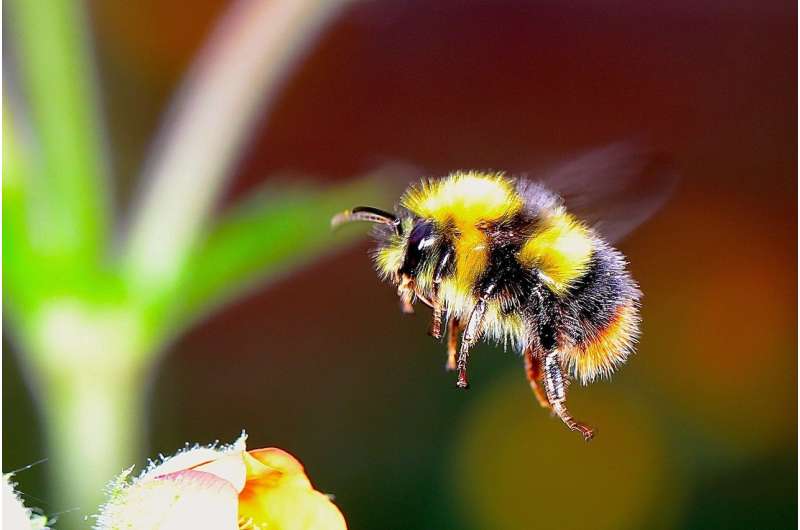Air pollution is not just a human problem, it’s also changing the guts of British bumble bees

Recent research from the University of Leicester, UK, has identified that air pollution affects the intricate web of microbes that are all around us. Populations of bees are also declining worldwide, so the Leicester team is investigating whether these two factors are connected. Researchers are now looking into the effects of air pollution on the bee gut microbiome, a community of beneficial bacteria vital to maintaining bee health.
The team is researching how air pollution affects a bee’s beneficial gut bacteria and microbiome composition, and the subsequent impact on bee health. Dr. Hannah Sampson, first author on the study, explains, “We know that pollution is a massive issue globally and we know that bee decline seems to be increasing over the last few years. Maybe they’re linked, as bees are constantly exposed to these pollution particulates in the air.”
The bumble bee has a delicate gut microbiome that has co-evolved with bee species over millions of years. The balance of the bacteria in the bee gut microbiome is vital to maintaining bee health, and any disruption to this microbiome could pose a risk not only to bee health but to pollination and global food security. Snodgrassella alvi is a beneficial member of the bee gut microbiome; it colonizes bees’ large intestine in a structure called a biofilm. A biofilm is a protective matrix that promotes bacterial colonization on surfaces (like plaque on teeth). S. alvi is especially important, as it is one of the initial colonizers of the bee gut microbiome.
Dr. Sampson, part of the air pollution bacteria team led by Professor Morrissey at the University of Leicester, grew S. alvi in lab conditions and exposed it to black carbon air pollution. She found that exposure to black carbon changed the behavior of S. alvi and the structure and formation of the bacteria’s biofilm. This is worrying, as any disruption to this could have knock-on effects to the overall composition and function of the bee gut microbiome.
Researchers also looked at the effects of black carbon pollution on live bumble bees. They sampled bees before and after exposure and measured the abundance of bacteria in their gut to observe any differences. The researchers found that there was a significant change in the abundance of two beneficial bacteria that are vital to the health of the bee gut microbiome.
While Dr. Sampson urges caution in concluding that air pollution directly contributes to bee population decline from this initial study, she is clear on the importance of understanding this interaction to learn how to better protect our planet.
“More research needs to take place as air pollution is having a much greater impact than we think. Air pollution affects microbial communities. Changes to these important communities could have detrimental effects on lots of different ecosystems that affect bees and also directly affect humans,” she notes.
Provided by
Microbiology Society
Citation:
Air pollution is not just a human problem, it’s also changing the guts of British bumble bees (2023, April 13)
retrieved 13 April 2023
from https://phys.org/news/2023-04-air-pollution-human-problem-guts.html
This document is subject to copyright. Apart from any fair dealing for the purpose of private study or research, no
part may be reproduced without the written permission. The content is provided for information purposes only.
For all the latest Science News Click Here
For the latest news and updates, follow us on Google News.

